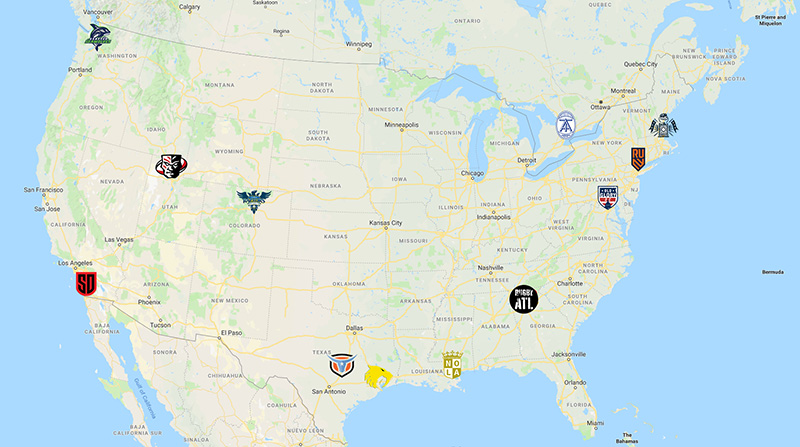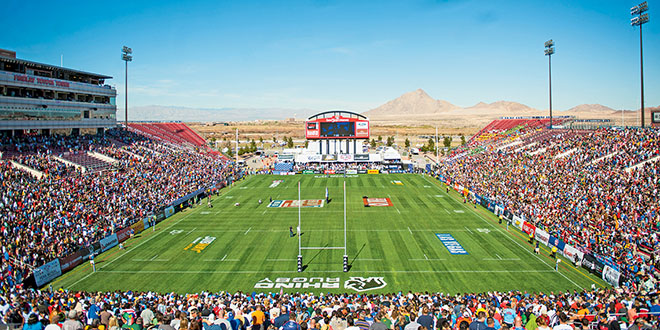The Americas is the only World Rugby region yet to host a RWC. This could change over the coming decade as bids for RWCs 2027 and 2031 may include countries from the Americas.
No country has a larger economy than the USA. This reason alone has World Rugby staff excited at the prospect of the country playing host to a Rugby World Cup. There is a case to be made that the USA should host, to which this article addresses to consider if the country can host a RWC.
WORLD CUP PERFORMANCES
| RWC | FINAL PLACING | RESULTS |
| 1987 | Group Stage |
Won vs Japan Lost vs Australia, England |
| 1991 | Group Stage | Lost vs England, Italy, New Zealand |
| 1995 | Did Not Qualify | – |
| 1999 | Group Stage | Lost vs Australia, Ireland, Romania |
| 2003 | Group Stage |
Won vs Japan Lost vs Fiji, France, Scotland |
| 2007 | Group Stage | Lost vs England, Samoa, South Africa, Tonga |
| 2011 | Group Stage |
Won vs Russia Lost vs Australia, Ireland, Italy |
| 2015 | Group Stage | Lost vs Japan, Samoa, Scotland, South Africa |
| 2019 | Group Stage | Lost vs Argentina, England, France, Tonga |
The RWC results of the USA Eagles are not strong at RWCs. Yet, they ought to be compared to Japan to obtain a viable comparison. The Asian country performed very well at RWCs 2015 and 2019, defeating Tier 1 sides Ireland, Scotland, and South Africa. However, prior to winning the RWC 2019 hosting rights, Japan has two draws against Canada and the one win was over Zimbabwe at RWC 1987.
RWC HOSTING CRITERIA
The World Rugby administration is firm in demanding financially sound hosting bids. The majority of voters on the World Rugby Council agree which was a leading reason for why France secured RWC 2023 hosting rights despite World Rugby having preferred South Africa.
In addition to market size, facilities are vital. World Rugby’s requirement is a venue seating 60,000 spectators for the RWC Final. Additional stadium sizes are flexible with France 2023 having nine venues, a lower number than all tournaments in the professional era. France 2023will not have venues comparable to Launceston and Wollongong (2003); Invercargill, Nelson, Palmerston North and Whangarei (2011); Exeter and Gloucester (2015); or Kamaishi (2019) which all seated under 20,000 spectators.
Japan 2019 featured twelve venues, while the 2002 FIFA World Cup had ten Japanese venues and a further ten in South Korea. Five of the venues were repeated, with World Rugby opting for more variety in venue sizes which saw smaller stadiums in Tokyo and Osaka than in the 2002 FIFA World Cup.
RUGBY HOSTING EXPERIENCE
Following a failed bid to host RWC 2011, Japan bid again and won the rights to RWC 2019 in May 2009. In October 2009, Japan made a statement as a crowd of 46,000 attended Australia vs New Zealand at Tokyo Stadium.
Five years later the USA Eagles had home advantage against New Zealand at Chicago’s Soldier Field. The NFL venue set a USA attendance record of 61,500 for a rugby match in the country. In addition to being larger than the requirement to host a RWC, it was also larger than all RWC 2019 attendances aside from matches played at Yokohama.
Japan 2019 was strongly attended with venues carefully chosen. As such, 70,103 attended the RWC 2019 Final in Yokohama; 21,069 were at Osaka for Fiji vs Georgia; and 14,025 attended Fiji vs Uruguay in Kamaishi.
WHERE TO HOST RWC MATCHES
Crowds of over 20,000 were in attendance at the BBVA Compass Stadium for USA vs Ireland and Scotland in 2013 and 2014 in Houston; and at the Red Bull Arena for the USA vs Ireland in New Jersey (New York area) in 2017.
With a capacity of 22,000, the BBVA Compass Stadium is a comparable venue to Fukuoka, Kumagaya, and Osaka. It is thereby suitable for a RWC with Houston’s 72,000 NFL venue, Reliant Stadium not required. Moreover, it was also the setting for the USA’s famous win over Scotland in 2018, making it a venue with historical rugby significance.
The Chicago, New Jersey and Houston examples demonstrate how a Rugby World Cup could operate in the USA. In short, it can be done by loosely using Major League Rugby cities together with past hosts of major rugby events such as San Francisco and Las Vegas.

ACCESSIBILITY
A further crucial factor is accessibility. The USA is one of the world’s largest countries and does not have a nationwide train system comparable to France or Japan. It does, however have hub airports, many of which are in MLR cities.
If World Rugby could acquire the sponsorship of a major carrier such as Delta or United then the size issue would be addressed with perfection. For instance if Delta were to sponsor then this would mean the hub cities of MLR located team’s Atlanta, Boston, Los Angeles, New York, Seattle, and Salt Lake City. Alternatively, with United this would mean Denver, Houston, Los Angeles, New York (Newark), Washington (Dulles) plus the bonus cities of Chicago and San Francisco.
Another means of organizing the tournament would be to spread the pools. Australia 2003 partially did so with all Perth matches being from Pool C. In the USA this may mean broadly defined regions as East, Central, and Pacific.
VENUE SELECTION
By contrasting Japan 2019 to France 2019 it is safe to suggests that a twelve venue tournament is the viable pathway for a hypothetical USA 2031. Under this model Chicago would host the RWC 2031 Final with Atlanta, Boston, San Francisco, Seattle all examples of adequate options for additional play-off matches. Listed below are sample venues from east to west.
| CITY | VENUE | CAPACITY |
| Boston | Fenway Park | 37,731 |
| New York | Yankee Stadium | 28,743 |
| Washington DC | Audi Field | 20,000 |
| Atlanta | Bobby Dodd Stadium | 55,000 |
| Chicago | Soldier Field | 61,500 |
| Houston | BBVA Compass Stadium | 22,000 |
| Denver | DSG Park | 19,680 |
| Salt Lake City | Rio Tinto Stadium | 20,213 |
| Las Vegas | Sam Boyd Stadium | 36,800 |
| Los Angeles | Dignity Health Sports Park | 30,000 |
| San Francisco | Oracle Park | 42,000 |
| Seattle | CenturyLink Field | 68,000 |
VERDICT
With the backing of World Rugby and a profitable USA Rugby institution, the USA could host a RWC with similar venue capacities to Japan 2019.
 Americas Rugby News Rugby news from across the Americas!
Americas Rugby News Rugby news from across the Americas!




